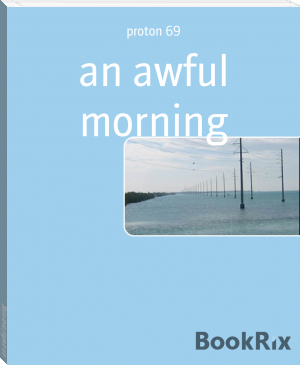Literary Lapses, Stephen Leacock [mobi reader txt] 📗

- Author: Stephen Leacock
Book online «Literary Lapses, Stephen Leacock [mobi reader txt] 📗». Author Stephen Leacock
There was one incident in Smith's career which he did, perhaps, share with regret. He had scarcely reached manhood when he met the most beautiful girl in the world. She was different from all other women. She had a deeper nature than other people. Smith realized it at once. She could feel and understand things that ordinary people couldn't. She could understand him. She had a great sense of humour and an exquisite appreciation of a joke. He told her the six that he knew one night and she thought them great. Her mere presence made Smith feel as if he had swallowed a sunset: the first time that his finger brushed against hers, he felt a thrill all through him. He presently found that if he took a firm hold of her hand with his, he could get a fine thrill, and if he sat beside her on a sofa, with his head against her ear and his arm about once and a half round her, he could get what you might call a first-class, A-1 thrill. Smith became filled with the idea that he would like to have her always near him. He suggested an arrangement to her, by which she should come and live in the same house with him and take personal charge of his clothes and his meals. She was to receive in return her board and washing, about seventy-five cents a week in ready money, and Smith was to be her slave.
After Smith had been this woman's slave for some time, baby fingers stole across his life, then another set of them, and then more and more till the house was full of them. The woman's mother began to steal across his life too, and every time she came Smith had hydrophobia frightfully. Strangely enough there was no little prattler that was taken from his life and became a saddened, hallowed memory to him. Oh, no! The little Smiths were not that kind of prattler. The whole nine grew up into tall, lank boys with massive mouths and great sweeping ears like their father's, and no talent for anything.
The life of Smith never seemed to bring him to any of those great turning-points that occurred in the lives of the great. True, the passing years brought some change of fortune. He was moved up in his dry-goods establishment from the ribbon counter to the collar counter, from the collar counter to the gents' panting counter, and from the gents' panting to the gents' fancy shirting. Then, as he grew aged and inefficient, they moved him down again from the gents' fancy shirting to the gents' panting, and so on to the ribbon counter. And when he grew quite old they dismissed him and got a boy with a four-inch mouth and sandy-coloured hair, who did all Smith could do for half the money. That was John Smith's mercantile career: it won't stand comparison with Mr. Gladstone's, but it's not unlike your own.
Smith lived for five years after this. His sons kept him. They didn't want to, but they had to. In his old age the brightness of his mind and his fund of anecdote were not the delight of all who dropped in to see him. He told seven stories and he knew six jokes. The stories were long things all about himself, and the jokes were about a commercial traveller and a Methodist minister. But nobody dropped in to see him, anyway, so it didn't matter.
At sixty-five Smith was taken ill, and, receiving proper treatment, he died. There was a tombstone put up over him, with a hand pointing north-north-east.
But I doubt if he ever got there. He was too like us.
On Collecting Things
Like most other men I have from time to time been stricken with a desire to make collections of things.
It began with postage stamps. I had a letter from a friend of mine who had gone out to South Africa. The letter had a three-cornered stamp on it, and I thought as soon as I looked at it, "That's the thing! Stamp collecting! I'll devote my life to it."
I bought an album with accommodation for the stamps of all nations, and began collecting right off. For three days the collection made wonderful progress. It contained:
One Cape of Good Hope stamp.
One one-cent stamp, United States of America.
One two-cent stamp, United States of America.
One five-cent stamp, United States of America.
One ten-cent stamp, United States of America.
After that the collection came to a dead stop. For a while I used to talk about it rather airily and say I had one or two rather valuable South African stamps. But I presently grew tired even of lying about it.
Collecting coins is a thing that I attempt at intervals. Every time I am given an old half-penny or a Mexican quarter, I get an idea that if a fellow made a point of holding on to rarities of that sort, he'd soon have quite a valuable collection. The first time that I tried it I was full of enthusiasm, and before long my collection numbered quite a few articles of vertu. The items were as follows:
No. 1. Ancient Roman coin. Time of Caligula. This one of course was the gem of the whole lot; it was given me by a friend, and that was what started me collecting.
No. 2. Small copper coin. Value one cent. United States of America. Apparently modern.
No. 3. Small nickel coin. Circular. United States of America. Value five cents.
No. 4. Small silver coin. Value ten cents. United States of America.
No. 5. Silver coin. Circular. Value twenty-five cents. United States of America. Very beautiful.
No. 6. Large silver coin. Circular. Inscription, "One Dollar." United States of America. Very valuable.
No. 7. Ancient British copper coin. Probably time of Caractacus. Very dim. Inscription, "Victoria Dei gratia regina." Very valuable.
No. 8. Silver coin. Evidently French. Inscription, "Funf Mark. Kaiser Wilhelm."
No. 9. Circular silver coin. Very much defaced. Part of inscription, "E Pluribus Unum." Probably a Russian rouble, but quite as likely to be a Japanese yen or a Shanghai rooster.
That's as far as that collection got. It lasted through most of the winter and I was getting quite proud of it, but I took the





Comments (0)